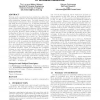Free Online Productivity Tools
i2Speak
i2Symbol
i2OCR
iTex2Img
iWeb2Print
iWeb2Shot
i2Type
iPdf2Split
iPdf2Merge
i2Bopomofo
i2Arabic
i2Style
i2Image
i2PDF
iLatex2Rtf
Sci2ools
114
click to vote
MOBIHOC
2008
ACM
2008
ACM
Analyzing DISH for multi-channel MAC protocols in wireless networks
For long, node cooperation has been exploited as a data relaying mechanism. However, the wireless channel allows for much richer interaction between nodes. One such scenario is in a multi-channel environment, where transmitter-receiver pairs may make incorrect decisions (e.g., in selecting channels) but idle neighbors could help by sharing information to prevent undesirable consequences (e.g., data collisions). This represents a Distributed Information SHaring (DISH) mechanism for cooperation and suggests new ways of designing cooperative protocols. However, what is lacking is a theoretical understanding of this new notion of cooperation. In this paper, we view cooperation as a network resource and evaluate the availability of cooperation via a metric, pco, the probability of obtaining cooperation. First, we analytically evaluate pco in the context of multi-channel multi-hop wireless networks. Second, we verify our analysis via simulations and the results show that our analysis accura...
Related Content
| Added | 24 Dec 2009 |
| Updated | 24 Dec 2009 |
| Type | Conference |
| Year | 2008 |
| Where | MOBIHOC |
| Authors | Tie Luo, Mehul Motani, Vikram Srinivasan |
Comments (0)

